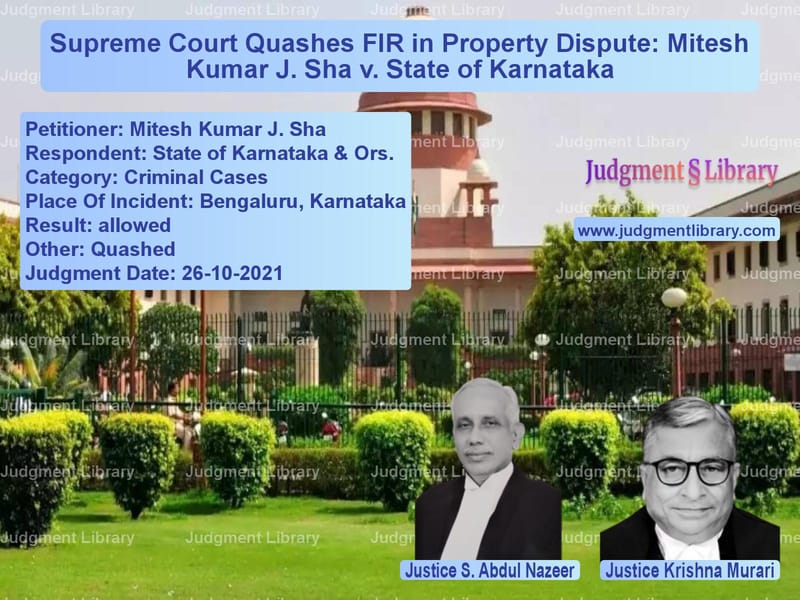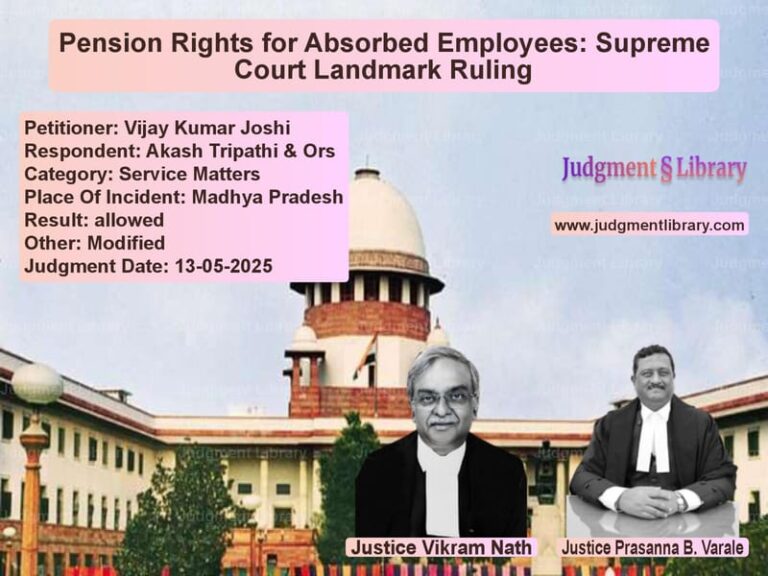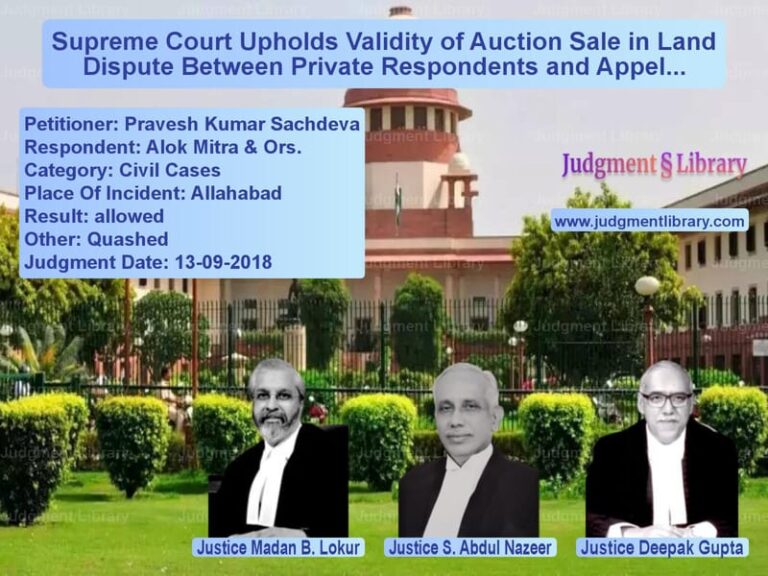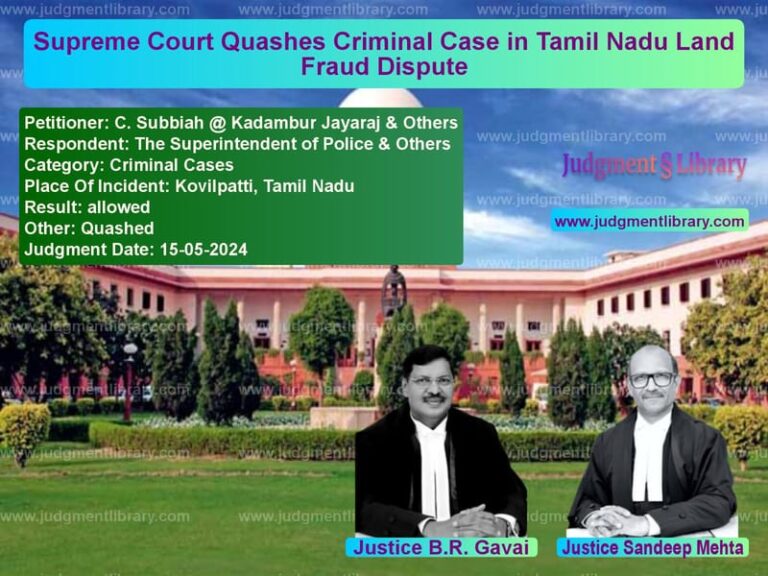Supreme Court Quashes FIR in Property Dispute: Mitesh Kumar J. Sha v. State of Karnataka
The Supreme Court of India recently delivered a significant ruling in Mitesh Kumar J. Sha v. State of Karnataka, wherein it quashed an FIR and related criminal proceedings against the appellant in a property development dispute. The Court held that the case was primarily of a civil nature and that criminal law could not be misused to settle business disputes.
Background of the Case
The dispute arose from a Joint Development Agreement (JDA) executed between Rajarajeshwari Buildcon Private Ltd., represented by its directors (the appellants), and Respondent No. 2, a property owner. The agreement, signed on August 7, 2013, allowed the developer company to construct residential apartments on the respondent’s land. Key provisions of the agreement included:
- The developed property would be shared between the landowner and the developer.
- A General Power of Attorney (GPA) was executed, giving the developer authority to sell certain units.
- A Supplementary Agreement was later signed to clarify the division of undivided land and built-up area.
Subsequently, on February 19, 2015, a Memorandum of Understanding (MoU) was signed, authorizing the developer to sell 8,000 sq. ft. of the landowner’s share to recover a loan taken from Religare Finvest Ltd.
Allegations Leading to Criminal Proceedings
Disputes arose when the developer company sold flats beyond the 8,000 sq. ft. limit allegedly agreed upon verbally. The key allegations were:
- The developer had executed sale deeds for flats in excess of its share.
- Four additional flats (Flat Nos. 002, 301, 304, and 404) were sold beyond the agreed limit.
- The landowner revoked the GPA and filed a criminal complaint on March 29, 2016.
- The police registered an FIR No. 185/2016 for offenses under Sections 406, 419, and 420 read with Section 34 IPC.
Legal Issues Considered
- Whether the allegations constituted a criminal offense or were purely a civil dispute.
- Whether the developer had the legal authority to sell additional flats.
- Whether the High Court erred in refusing to quash the FIR.
Petitioner’s (Mitesh Kumar J. Sha) Arguments
The appellants contended:
- The dispute was purely of a civil nature, arising from a contract between two private parties.
- The landowner had initially agreed to the sale of additional flats in exchange for loan repayments.
- The High Court had wrongly refused to quash the FIR despite the pending arbitration proceedings.
- The landowner was trying to turn a commercial dispute into a criminal case to exert pressure.
Respondent’s (State of Karnataka and Landowner) Arguments
The respondents countered:
- The developer had no written authorization to sell additional flats.
- The sale of excess flats amounted to cheating and breach of trust.
- The FIR and criminal case should proceed as the developer had fraudulently exceeded its authority.
Supreme Court’s Observations
On the Nature of the Dispute
The Supreme Court held that the allegations did not constitute a criminal offense:
“The dispute between the parties, at best, involves a breach of contract. It does not meet the legal requirements of cheating or criminal breach of trust.”
On the High Court’s Error
The Court criticized the High Court for not quashing the FIR:
“The High Court failed to recognize that the allegations were purely contractual and should be adjudicated in civil proceedings, not through criminal law.”
On the Misuse of Criminal Law
The Court reiterated that business disputes should not be criminalized:
“There is a growing tendency to convert civil disputes into criminal cases to pressurize the other party. Such misuse of criminal law must be discouraged.”
Final Judgment
The Supreme Court ruled:
- The High Court’s refusal to quash the FIR was set aside.
- The FIR No. 185/2016 and all related criminal proceedings were quashed.
- The dispute should be resolved through civil and arbitration proceedings.
Significance of the Judgment
- Prevents Criminalization of Civil Disputes: Reinforces that business and property disputes should be resolved through civil law.
- Limits Judicial Overreach: Clarifies that criminal courts should not intervene in purely contractual matters.
- Protects Business Transactions: Provides relief to businesses from harassment through wrongful criminal proceedings.
Conclusion
The Supreme Court’s ruling in Mitesh Kumar J. Sha v. State of Karnataka is a landmark judgment that strengthens legal safeguards against the misuse of criminal law in contractual disputes. By quashing the FIR, the Court has reinforced the principle that disputes arising from agreements should be settled through civil remedies, not through criminal prosecution.
Petitioner Name: Mitesh Kumar J. Sha.Respondent Name: State of Karnataka & Ors..Judgment By: Justice S. Abdul Nazeer, Justice Krishna Murari.Place Of Incident: Bengaluru, Karnataka.Judgment Date: 26-10-2021.
Don’t miss out on the full details! Download the complete judgment in PDF format below and gain valuable insights instantly!
Download Judgment: mitesh-kumar-j.-sha-vs-state-of-karnataka-&-supreme-court-of-india-judgment-dated-26-10-2021.pdf
Directly Download Judgment: Directly download this Judgment
See all petitions in Fraud and Forgery
See all petitions in Property Disputes
See all petitions in Contract Disputes
See all petitions in Judgment by S. Abdul Nazeer
See all petitions in Judgment by Krishna Murari
See all petitions in allowed
See all petitions in Quashed
See all petitions in supreme court of India judgments October 2021
See all petitions in 2021 judgments
See all posts in Criminal Cases Category
See all allowed petitions in Criminal Cases Category
See all Dismissed petitions in Criminal Cases Category
See all partially allowed petitions in Criminal Cases Category







